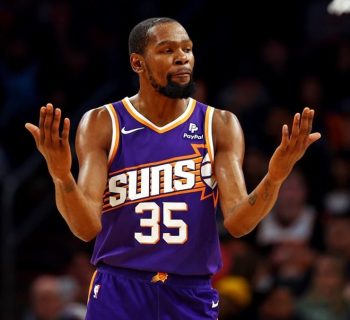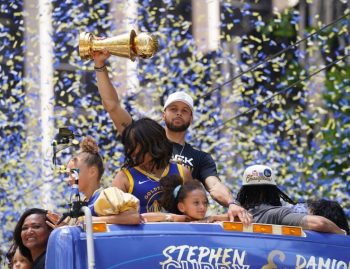NBA
NBA PM: Can Wizards Win Without Wall?

Can Wizards Win Without Wall?
The fact that Washington Wizards point guard John Wall has five displaced fractures in his hand and wrist most likely means that he’s done for the postseason, joining Cleveland Cavaliers power forward Kevin Love as another integral Eastern Conference star leaving his team shorthanded in pursuit of a championship.
However, the difference between Wall and Love is that the Wizards don’t have anywhere near the depth to weather this particular injury. Wall had been playing like a borderline MVP through the first five playoffs games of the postseason, averaging 17.4 points, 12.6 assists and 4.6 rebounds while leading the Wizards to a 5-0 record. Losing all of that production is a massive problem.
Of course, that five-game winning streak was snapped in Atlanta on Tuesday, when the Wizards lost Game 2 playing without their revered leader. In his career, the Wizards are 10-40 when Wall isn’t on the floor, which obviously doesn’t bode well for the team’s future as it faces the top-seeded Hawks in the remainder of the Eastern Conference Semifinals. Even if they somehow find a way to win (and it isn’t impossible, especially with the homecourt advantage they stole away in Game 1), they’ll have to face either Cleveland or Chicago in the next round. Then, if they advance again, they’ll battle a Western Conference powerhouse.
In short, the future is not bright.
Things could have been remarkably different, with all the other three teams in the Eastern Conference showing chinks in their armor. Atlanta is beatable, especially with no true star to take over late in close games, Cleveland is down Love and Chicago is about as inconsistent as NBA teams come. With Wall, there was a reasonable scenario in which the Wizards could have reached the Finals. Without him, it’s a completely different story.
While Paul Pierce will almost certainly try to rally the troops, the numbers show that Wall’s influence is essentially irreplaceable. According to John Schuhmann of NBA.com, Washington has been scoring 115.7 points per possession with Wall on the floor and 96 without him. Also significant, he has generated 30.8 points per game from his assists, more than any other player in the NBA by 12 points per game.
Also, the players one would expect to pick up the slack, like Marcin Gortat and Pierce, have seen a huge number of their made baskets come off of Wall assists this postseason, so replacing him with Ramon Sessions full-time isn’t going to go as smoothly as some would hope. Wall breaks down offenses by attacking the basket (he’s leading the postseason with 8.6 drives per game, according to Alex Wong of Sports on Earth), and without him keeping defenses honest, the same scoring opportunities simply aren’t going to be there for the rest of the team.
If Wall’s broken hand does keep him out for the remainder of the postseason as expected, the Wizards are toast. Beating Atlanta isn’t impossible, but any dream beyond that would be of the pipe variety.
Most Improved Players Who Floundered
The Most Improved Player award has only been around since 1986, making it one of the more recent annual accolades doled out by the higher-ups in the NBA. But over the years voters have, at times, struggled to figure out what kind of “most improved” player to vote for.
On the one hand, there are players who were absolute nobodies one season and then found some sort of relevance in the year that followed. On the other hand, there are players who were already kind of good one season and suddenly became exceptional. In recent years, voters have leaned toward the second group, with players like Jimmy Butler, Goran Dragic, Paul George and Kevin Love all winning the award over the course of the last half decade.
These players’ later work has shown that this award can serve as a stepping stone toward greater things, but not all of the players on the list have seen such significant success. Here’s a look at a few past winners who all but disappeared shortly after winning Most Improved Player:
Don MacLean (1993-94) – In MacLean’s award-winning season with the Washington Bullets, he averaged a career-high 18.2 points and 6.2 rebounds while shooting 50.2 percent from the floor and 82.4 percent from the three-throw line. Admittedly, those are pretty solid numbers for any player, but unfortunately for MacLean he would never come even remotely close to matching them the remainder of his career. The next season, his third with the Bullets, would be his last in D.C. In fact, he wouldn’t play two years with the same team the rest of his career. He spent time with Denver, Philadelphia, New Jersey, Seattle, Phoenix and Miami in the seasons to come, and his numbers would grow progressively worse with time. He stuck around for a while, but his MIP year was the end of his prime rather than the beginning of it.
Gheorghe Muresan (1995-96) – One of the tallest men in NBA history, this 7’7 giant put up a huge year in his third season in the league, averaging 14.5 points, 9.6 rebounds and 2.3 blocks, and he also led the league in field goal percentage that season (58.4 percent) and the following one (60.4 percent). But the year following his Most Improved Player award was his last healthy one, as Muresan would only manage 31 total games over two final seasons with the New Jersey Nets. It’s no shock a man his size would face some injury issues, but he did dabble a little in acting later in his career, most notably in the 1998 Bill Crystal film “My Giant.” He even appeared in the Eminem “My Name Is” video in the late ‘90s, but now he’s a respected team ambassador for the Washington Wizards, working in the team’s marketing and public relations department. He’s a likeable guy and obviously pretty recognizable.
Isaac Austin (1996-97) – Austin’s return to the NBA was rather glorious after a two-year absence that forced him to play for two different European teams from 1994 to 1996. But while it wasn’t necessarily a monstrous season for the big man, it was a breakout year for him, as he averaged 9.7 points and 5.8 rebounds for the Miami HEAT and even started 17 games. The following year was even better for him, as he jumped up to an even-better 13.5 points and 7.1 rebounds, but after that his numbers flattened out and his scoring output decreased every season in his next (and final) four years in the NBA. In 2002, he ended up back in Turkey and he never found his way back to the league.
Bobby Simmons (2004-05) – It took four seasons for Bobby Simmons to finally break out for the L.A. Clippers, but when he finally got there, the results were really solid. Simmons averaged 16.4 points in 2004-05, to go along with 5.9 rebounds and 1.4 steals. His next season he signed with Milwaukee and was still productive, but slightly less so (13.4 points and 4.4 rebounds), and an ankle injury the following year forced him to miss the entire season. He would never be the same. Things really dropped off during the next four years, and he would never top eight points per game again. He lasted in the NBA for over a decade, but his Most Improved Award wasn’t a springboard to bigger and better things.
For many former Most Improved Players, the award is a springboard, as former winners include studs like Tracy McGrady, Jermaine O’Neal, Gilbert Arenas and Zach Randolph. But here’s an interesting little tidbit: of the 30 winners of this award, only Boris Diaw has a championship ring.
This accolade is a prestigious one, and many players who win go on to be All-Stars and make All-NBA Teams. The one thing missing for these guys, though, is a championship. Maybe Jimmy Butler will be different, but history suggests that he will not be.













